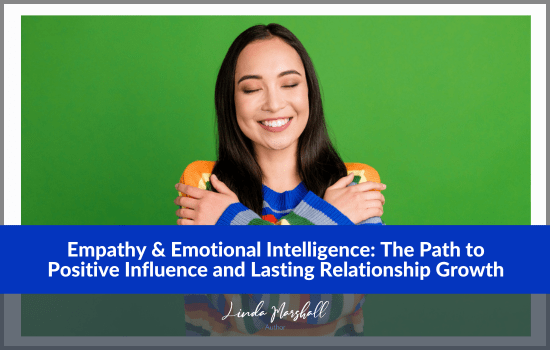Empathy is a core element of emotional intelligence and the foundation of meaningful relationship building. When we understand and appreciate the emotions of others, we strengthen communication, deepen trust, and create a positive influence in every interaction. By intentionally developing empathy, we not only enhance our relationships but also support our own personal and professional growth. This journey enables us to connect more authentically, collaborate more effectively, and build relationships that are resilient, supportive, and deeply fulfilling.
THE POWER OF EMOTION | CHAPTER 23 | OVERVIEW
How Empathy Shapes Emotional Intelligence and Drives Strong Relationship Building and Communication
Welcome to a profound exploration of emotional intelligence as we embark on a journey to unlock the key component of meaningful connections – empathy. In the intricate tapestry of human interaction, the relationship between empathy and success is undeniable, and understanding this skill becomes paramount in navigating the complexities of our personal and professional lives.
Let’s explore the nuances of empathy as a foundational element of emotional intelligence, examining its role in fostering authentic relationships, enhancing effective communication, and inspiring personal growth. Ultimately, empathy is a driver of positive influence, shaping the way we connect and succeed.

Are You an Empathetic Person?
Empathy is considered the foundation of emotional intelligence because it involves understanding and sharing the feelings of others. Emotional intelligence encompasses the ability to recognize, understand, and manage both our own emotions and the emotions of others. Empathy allows us to connect with others on an emotional level, which is crucial for effective communication, building trust, and cultivating relationships. By being empathetic, we can better understand others' perspectives, respond appropriately to their emotions, and navigate social interactions with greater sensitivity and understanding. Empathy forms a fundamental building block for emotional intelligence by fostering greater self-awareness, social awareness, and interpersonal skills, all of which strengthen both our personal growth and our ability to exert a positive influence.
I’ve worked with numerous individuals lacking empathy and emotional intelligence during my career. Some were my colleagues, supervisors, and employees. Without a doubt, all were challenging to work with.
What Happens When Someone Lacks Empathy?
Individuals lacking empathy can have a significant impact on those around them. Here are a few ways their lack of empathy can affect others:
-
Strained relationships: Without empathy, it becomes challenging to understand and connect with the emotions and experiences of others. This deficit can strain personal and professional relationships, as empathy is crucial for relationship building, trust, and meaningful connections.
-
Communication difficulties: Empathy plays a vital role in effective communication. When someone lacks empathy, they may struggle to listen attentively, validate others' emotions, or respond appropriately to their needs. This behaviour can lead to misunderstandings, conflicts, and breakdowns in communication.
-
Emotional disconnect: People without empathy may struggle to recognize or understand the emotions of others. This creates an emotional gap, making it difficult for them to offer support or provide a positive influence during crucial moments.
-
Reduced cooperation and teamwork: Empathy is crucial for successful teamwork and collaboration. Without it, individuals may struggle to understand the needs and perspectives of their team members, which can hinder cooperation, compromise, and effective problem-solving.
-
Lack of support: Empathy enables us to offer care during challenging times. When it’s absent, individuals may not provide the support or validation others need, leaving them feeling isolated, unseen, or disconnected.
Research underscores these consequences. For instance, a recent Egyptian university study found that students with lower emotional maturity and weaker communication skills were more likely to exhibit symptoms of anxiety and depression, with communication skills playing a mediating role between emotional maturity and mental health outcomes. (Source: SpringerNature Link)
Similarly, a Chinese student study demonstrated that emotional intelligence was positively linked to psychological well-being and academic success, mediated by traits like self-efficacy, motivation, and resilience. (Source: BioMed Central) These findings underscore the significant impact of deficits in empathy and emotional intelligence, extending beyond relationships to encompass mental health and overall life satisfaction.
We Can Increase Our Empathy
We develop empathy by perceiving others' feelings, understanding their emotions, and utilizing that understanding to relate to them more effectively. The emphasis must be on "emotion," connecting with how others feel. Without question, individuals who lack empathy will struggle with relationship building and effective communication. The good news is empathy can be developed, and doing so enriches our personal growth and expands our capacity for positive influence.
Some people are naturally empathetic and regularly practice these skills, but empathy can also be intentionally cultivated. Adults can grow their empathetic skills to advance their emotional intelligence and foster stronger relationships with others.
The Six Seconds “Journey of EQ” framework offers a structured, research-informed path. This “Theory of Change” frames how people move from awareness to integration, ultimately leading to impact—showing how consistent EQ work leads to deeper empathy, stronger relationships, and measurable improvements in well-being.
Also, studies of empathy over adulthood reveal that empathetic capacity can change with age. For example, one study observed increases in empathy across younger to middle adulthood (ages 18–45) before levelling off. Another analysis found that emotional empathy tends to be higher in older adults compared to younger adults, which supports models that view empathy as a capacity that can evolve over the lifespan. (Source: PsyPost - Psychology News)
Therefore, growth over time is both realistic and measurable.
How to Develop Empathy
First, people must recognize the need to strengthen their empathy. They must understand that this work is not only for their personal improvement but also for the greater good of their teams, organizations, and communities. With buy-in and commitment, they can practice new skills and see how empathy enhances effective communication, reduces conflict, and drives relationship building.
Here are a few suggestions to build empathy skills:
-
Focus on actively listening to others.
-
Put yourself in their shoes and seek to understand their perspective without judgment.
-
Engage in diverse experiences to broaden your worldview and deepen your understanding of different cultures and backgrounds.
-
Practice kindness and compassion in your daily interactions.
Strengthening empathy is a powerful way to elevate emotional intelligence, enhance communication, and improve relationship building. As we develop these skills, we expand our capacity to create a positive influence and foster meaningful growth in ourselves and others. To continue building these abilities, explore The Power of Emotion or consider taking an Emotional Intelligence Assessment to identify your strengths and focus areas. With intention and practice, every interaction becomes an opportunity to deepen connection, inspire trust, and shape relationships that truly matter.
This article was originally published on October 19, 2021, and has been updated (November 2025).
Get Social With Linda Marshall and Share
INSTAGRAM @LindaMarshallAuthor | FACEBOOK @LindaMarshallAuthor


